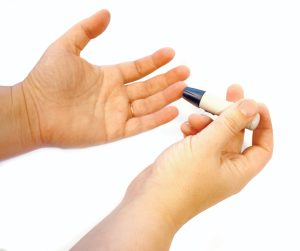 A driver struck a trooper while the trooper was directing traffic, and the trooper suffered serious injuries. The driver submitted a urine sample, and a urine test showed a concentration of inactive marijuana metabolite above the ‘legal limit’. The driver was charged with and convicted of Aggravated Vehicular Homicide and DUI (called ‘OVI’ in Ohio). The Ohio Supreme Court ultimately concluded operating a vehicle with a prohibited concentration of inactive marijuana metabolite can be a proximate cause of serious physical harm.
A driver struck a trooper while the trooper was directing traffic, and the trooper suffered serious injuries. The driver submitted a urine sample, and a urine test showed a concentration of inactive marijuana metabolite above the ‘legal limit’. The driver was charged with and convicted of Aggravated Vehicular Homicide and DUI (called ‘OVI’ in Ohio). The Ohio Supreme Court ultimately concluded operating a vehicle with a prohibited concentration of inactive marijuana metabolite can be a proximate cause of serious physical harm.
Articles Posted in DUI/OVI blood/breath/urine tests
Ohio Senate Passes Bill to Revise Marijuana DUI/OVI Law
 The Ohio Senate passed a bill which could significantly change Ohio’s law prohibiting marijuana DUI (called ‘OVI’ in Ohio). Senate Bill 55, passed on October 8, 2025, would amend and limit the types of marijuana OVI charges. It would also revise the rules regarding evidence admissibility in marijuana OVI trials.
The Ohio Senate passed a bill which could significantly change Ohio’s law prohibiting marijuana DUI (called ‘OVI’ in Ohio). Senate Bill 55, passed on October 8, 2025, would amend and limit the types of marijuana OVI charges. It would also revise the rules regarding evidence admissibility in marijuana OVI trials.
ABCs of PBTs in OH DUI/OVI
 Imagine you’re stopped by a police officer, and the officer suspects you’ve been drinking. They ask a few questions and mention they smell alcohol. The officer then reaches for a small handheld device and says, “I just need you to blow into this for me.” That device is a portable breath test, commonly called a PBT. What you decide to do can have an impact on your court case if you are charged with DUI (called ‘OVI’ in Ohio) or another alcohol-related offense.
Imagine you’re stopped by a police officer, and the officer suspects you’ve been drinking. They ask a few questions and mention they smell alcohol. The officer then reaches for a small handheld device and says, “I just need you to blow into this for me.” That device is a portable breath test, commonly called a PBT. What you decide to do can have an impact on your court case if you are charged with DUI (called ‘OVI’ in Ohio) or another alcohol-related offense.
Suppression of Blood Tests in Ohio Vehicular Homicide/Vehicular Assault Cases
 The defendant in an Ohio Vehicular Homicide/Vehicular Assault case filed a motion to suppress the results of his blood test. Blood test results may be suppressed for various reasons. In this case, the defendant argues the blood test did not comply with the requirements of the Ohio Revised Code and the Ohio Administrative Code.
The defendant in an Ohio Vehicular Homicide/Vehicular Assault case filed a motion to suppress the results of his blood test. Blood test results may be suppressed for various reasons. In this case, the defendant argues the blood test did not comply with the requirements of the Ohio Revised Code and the Ohio Administrative Code.
Law Enforcement Combats Increased Drugged Driving in Ohio
 The headline from a recent article read, “Narcotics-based OVIs Rise in Ohio”. A police officer interviewed for the article said he has observed an increase in the number of drug-related OVIs. A representative of the Ohio State Highway Patrol reported fatal marijuana-related crashes rose 52% from 2019 to 2023. To combat this problem, Ohio law enforcement agencies are now using oral fluid testing to help determine intoxication from marijuana and other drugs.
The headline from a recent article read, “Narcotics-based OVIs Rise in Ohio”. A police officer interviewed for the article said he has observed an increase in the number of drug-related OVIs. A representative of the Ohio State Highway Patrol reported fatal marijuana-related crashes rose 52% from 2019 to 2023. To combat this problem, Ohio law enforcement agencies are now using oral fluid testing to help determine intoxication from marijuana and other drugs.
Continue Reading
Hyperglycemia and DUI / OVI in Ohio
 A previous article in this blog discussed the potential impact of hypoglycemia (low blood sugar) on an investigation for DUI (called ‘OVI’ in Ohio). Hypoglycemia is not the only blood sugar condition which may affect an OVI investigation. Hyperglycemia (high blood sugar) may also cause symptoms which overlap with the symptoms of alcohol intoxication. In addition, hyperglycemia may inflate the results of a breath alcohol test.
A previous article in this blog discussed the potential impact of hypoglycemia (low blood sugar) on an investigation for DUI (called ‘OVI’ in Ohio). Hypoglycemia is not the only blood sugar condition which may affect an OVI investigation. Hyperglycemia (high blood sugar) may also cause symptoms which overlap with the symptoms of alcohol intoxication. In addition, hyperglycemia may inflate the results of a breath alcohol test.
Marijuana Sales Underway in Ohio: Drivers Beware
 A few days ago, legal recreational marijuana sales began in Ohio. At some dispensaries, there has been an overwhelming response, with customers standing in line to buy marijuana. As sales can only be made to people who are 21 and older, we can presume most of the recreational marijuana users are also car drivers. Those drivers should be aware of Ohio’s laws regarding marijuana and DUI (called ‘OVI’ in Ohio).
A few days ago, legal recreational marijuana sales began in Ohio. At some dispensaries, there has been an overwhelming response, with customers standing in line to buy marijuana. As sales can only be made to people who are 21 and older, we can presume most of the recreational marijuana users are also car drivers. Those drivers should be aware of Ohio’s laws regarding marijuana and DUI (called ‘OVI’ in Ohio).
U.S. Supreme Court Addresses Right to Confront Crime Lab Analyst
 In DUI cases (called ‘OVI’ in Ohio), a defendant’s blood or urine sample may be tested by a crime lab to determine the concentration of alcohol and/or drugs in the sample. In court, a lab analyst testifies regarding the blood or urine testing and the results of the test. But what if the analyst testifying is not the analyst who conducted the test? The recent case of Smith v. Arizona addressed whether this violates the defendant’s right to confront witnesses.
In DUI cases (called ‘OVI’ in Ohio), a defendant’s blood or urine sample may be tested by a crime lab to determine the concentration of alcohol and/or drugs in the sample. In court, a lab analyst testifies regarding the blood or urine testing and the results of the test. But what if the analyst testifying is not the analyst who conducted the test? The recent case of Smith v. Arizona addressed whether this violates the defendant’s right to confront witnesses.
Can a Driver Arrested for DUI/OVI Revoke Consent to a Blood Test?

When an officer arrests a driver for DUI (called ‘OVI’ in Ohio), the officer typically requests that the driver consent to a blood, breath, or urine test. However, a statute in the Ohio Revised Code (section 4511.191) says a driver arrested for OVI implicitly consents to those tests. Can a driver arrested for OVI revoke that consent? This question has not been directly addressed in Ohio but was recently answered by the Supreme Court of Colorado.
When Are Officers Permitted to Administer Breath Alcohol Tests?
 The Ontario Provincial Police (OPP) recently implemented a policy of administering a breath alcohol test to every driver stopped for a traffic offense. Even if the stop is for a minor violation, and even if the officer has no suspicion the driver is under the influence, the driver must submit to a breath test. Refusing the test is a criminal offense. Could this happen in Ohio?
The Ontario Provincial Police (OPP) recently implemented a policy of administering a breath alcohol test to every driver stopped for a traffic offense. Even if the stop is for a minor violation, and even if the officer has no suspicion the driver is under the influence, the driver must submit to a breath test. Refusing the test is a criminal offense. Could this happen in Ohio?
 Columbus OVI/DUI Attorney Blog
Columbus OVI/DUI Attorney Blog

